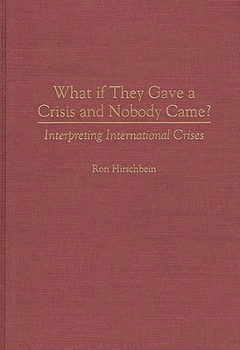What if They Gave a Crisis and Nobody Came? Interpreting International Crises
If wars are too important to be left to the generals, crises are too dangerous to be left exclusively to the social scientists. Humanistic inquiry has not realized its potential for illuminating these wars of words. Crises occur in a realm foreign to prevailing approaches, but familiar to interpretive approaches to politics. Decision-makers are no longer observers of unmistakable threats: they are interpreters of cryptic texts and symbolic performances. Accordingly, analysts (quite unwittingly) have become interpreters of interpretations--crises inquiry occurs in the archives, not the laboratory. Relying upon a hermeneutic approach used to illuminate crises at other times and places, Hirschbein explores the puzzling aspects of defining Kennedy, Nixon, and Kissinger episodes: Why is Kennedy's joust on the brink enshrined as the unforgettable Cuban missile crises, while Nixon and Kissingers' prudent resolution of a comparable threat is all but forgotten? This novel account of crises construction, management, and remembrance explores how and why these events were handled so differently, and concludes that it is not world that is the source of our crises, but our interpretation of the world.
Questions of crisis construction, management, and remembrance are at the heart of this study. Professor Hirschbein examines why American political figures define an event as a crisis--or not. He then analyzes why some crises are managed prudently, while others are not, despite access to comparable information and resources. Lastly, he tries to determine why some crises are enshrined as templates for future confrontation while others quickly fade into oblivion. Hirschbein argues that it is not the world that is the source of our crises, but our Iinterpretation R of the world. Accordingly, he explicates those official interpretations of the world known as international crises. This fascinating comparative study will be of great interest to students, scholars, and other researchers of American diplomacy and Peace Studies.




